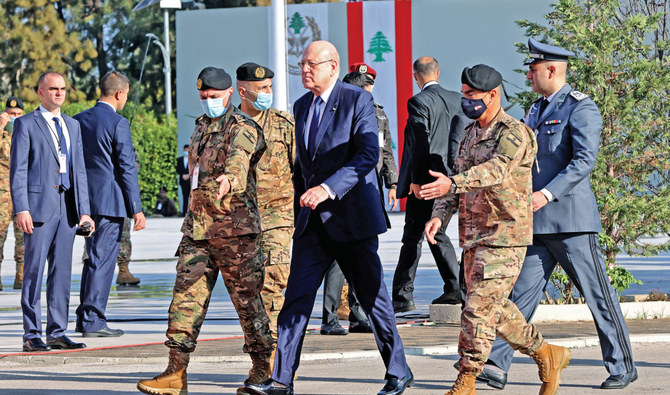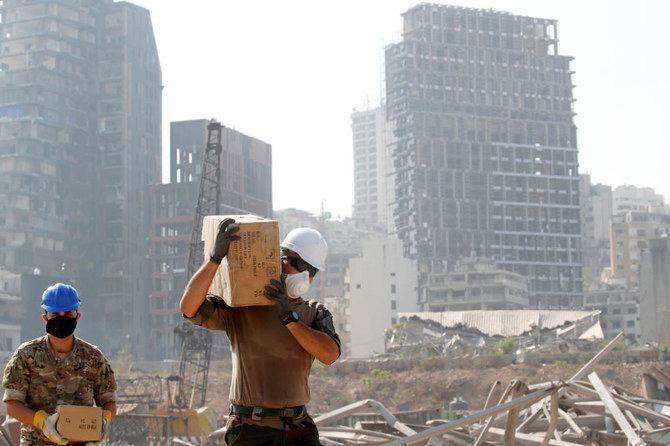
By Najia Houssari -- arabnews.com -- BEIRUT: Lebanese Prime Minister Najib Mikati has affirmed his government’s commitment to honoring its undertakings for reform. Mikati said that his joint phone call on Saturday with Saudi and French leaders was “an important step toward restoring historic brotherly relations with Riyadh.” A joint Saudi-French statement, following the joint phone call between Saudi Crown Prince Mohammed bin Salman and French President Macron with Mikati, linked “economic aid to Lebanon with the implementation of the required reforms.” The statement reiterated demands that Lebanon should “implement comprehensive reforms, monitor borders, abide by the Taif Agreement, limit arms to the legitimate state institutions and not be a launching pad for any terrorist acts that destabilize the region (nor) a source of drug trafficking.” Mikati also said: “I thank President Macron and Crown Prince Mohammed bin Salman for their keenness in maintaining the friendship toward Lebanon.”
Mikati called both President Michel Aoun and Parliament Speaker Nabih Berri and briefed them on the phone call. Mikati’s media office said that Aoun and Berri “expressed their satisfaction and stressed their adherence to the best relations with Saudi Arabia and all brotherly Arab countries, especially the Gulf Cooperation Council countries.” Mikati called “all parties in Lebanon to appreciate the sensitivity of the situation and circumstances and not to take any action or interfere in any matter that offends the Arab brothers and harms the Lebanese.” He added: “It is time to commit again to the policy of disassociation and not to involve ourselves and our country in what has nothing to do with us.” The Saudi position toward Lebanon left the Lebanese anxiously relieved about the extent of the seriousness of the ruling authority in implementing what was agreed on in Jeddah between French President Emmanuel Macron and Saudi Crown Prince Mohammed bin Salman.
بالغ الشكر وعظيم الامتنان للدول الصديقة وفي طليعتها الولايات المتحدة التي تدعم الجيش بالسلاح والعتاد والذخيرة وتحسين مستوى معيشة الضباط والرتباء والافراد. …

Al Arabiya -- Saudi Arabia’s Crown Prince Mohammed bin Salman, French President Emmanuel Macron and Lebanese Prime Minister Najib Mikati held a phone call on Saturday during which all three countries agreed to work together on reforms in Lebanon. “His Excellency the Lebanese Prime Minister expressed Lebanon's appreciation for the great efforts made by the Kingdom of Saudi Arabia and France to stand by the Lebanese people and the commitment of the Lebanese government to take everything that would strengthen relations with the Kingdom of Saudi Arabia and the Gulf Cooperation Council countries and reject everything that would harm their security and stability,” the Saudi Press Agency reported on the call. “It was agreed between the three countries to work together to support the comprehensive reforms necessary in Lebanon,” the statement added.
Macron announced on Saturday a Saudi-French initiative to solve a diplomatic row between several Gulf states and Lebanon. Saudi Arabia expelled Lebanon’s envoy to the kingdom, recalled its ambassador to Beirut and banned Lebanese imports after comments made by former Lebanese information minister George Kordahi.

By Najia Houssari -- arabnews.com -BEIRUT: Tons of wheat, corn and barley stored at the Port of Beirut since the devastating explosion that rocked the city 16 months ago are to be disposed of as they are no longer fit for consumption, it has been found. As temperatures change, mold, weevils and other insects have made it impossible to reach the contents of silos at the site without protective equipment; according to the World Health Organization, mold produces mycotoxins “which can cause a variety of adverse health effects and pose a serious health threat to both humans and livestock … ranging from acute poisoning to long-term effects such as immune deficiency and cancer.” Before the blast, the port’s silos contained about 45 tons of wheat, barley and corn, most of which was lost during the explosion. Minister of Environment Nasser Yassin said that six to seven tons remain at the site. Lab tests run on samples of wheat in cooperation with the ministries of economy, agriculture and environment, the American University of Beirut, Saint Joseph University, and the French Embassy, which brought in experts to assist, showed that the crops “are suitable for neither human nor animal use.”
In August, a year after the explosion, the remaining grains were removed from their silos and stored in the open air to reduce the risks of accidental fires in the hot weather, but resulted in hastening the demise of the crops as fit for consumption. A committee formed under the government of former Prime Minister Hassan Diab failed to reach a solution. Yassin told Arab News: “We decided to ferment these quantities and turn them into compost to be distributed to farmers for free, or turn them into industrial firewood to be given to the Lebanese Army to heat its units in the high mountains, or donate them to needy families living in cold areas.” He added: “Turning them into compost allows us to avoid any procedure that produces heavy metals, and we started with this process with the help of MAN Group, which obtained funding from France to treat organic waste resulting from the explosion, and had signed the contract with the Lebanese state in May.”
Khazen History


Historical Feature:
Churches and Monasteries of the Khazen family

St. Anthony of Padua Church in Ballouneh
Mar Abda Church in Bakaatit Kanaan
Saint Michael Church in Bkaatouta
Saint Therese Church in Qolayaat
Saint Simeon Stylites (مار سمعان العامودي) Church In Ajaltoun
Virgin Mary Church (سيدة المعونات) in Sheilé
Assumption of Mary Church in Ballouneh
1 - The sword of the Maronite Prince
2 - LES KHAZEN CONSULS DE FRANCE
3 - LES MARONITES & LES KHAZEN
4 - LES MAAN & LES KHAZEN
5 - ORIGINE DE LA FAMILLE
Population Movements to Keserwan - The Khazens and The Maans
ما جاء عن الثورة في المقاطعة الكسروانية
ثورة أهالي كسروان على المشايخ الخوازنة وأسبابها
Origins of the "Prince of Maronite" Title
Growing diversity: the Khazin sheiks and the clergy in the first decades of the 18th century
Historical Members:
Barbar Beik El Khazen [English]
Patriach Toubia Kaiss El Khazen(Biography & Life Part1 Part2) (Arabic)
Patriach Youssef Dargham El Khazen (Cont'd)
Cheikh Bishara Jafal El Khazen
Patriarch Youssef Raji El Khazen
The Martyrs Cheikh Philippe & Cheikh Farid El Khazen
Cheikh Nawfal El Khazen (Consul De France)
Cheikh Hossun El Khazen (Consul De France)
Cheikh Abou-Nawfal El Khazen (Consul De France)
Cheikh Francis Abee Nader & his son Yousef
Cheikh Abou-Kanso El Khazen (Consul De France)
Cheikh Abou Nader El Khazen
Cheikh Chafic El Khazen
Cheikh Keserwan El Khazen
Cheikh Serhal El Khazen [English]
Cheikh Rafiq El Khazen [English]
Cheikh Hanna El Khazen
Cheikha Arzi El Khazen
Marie El Khazen